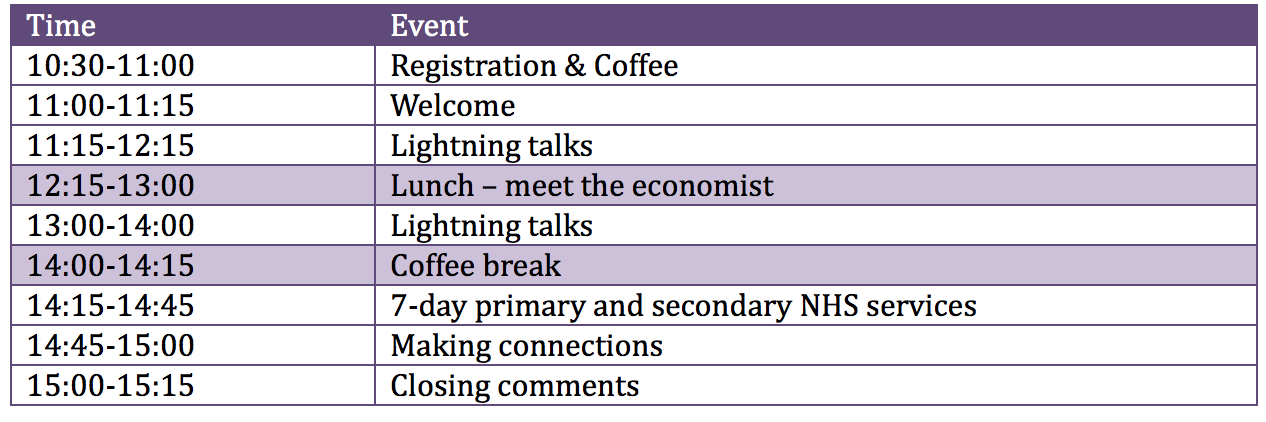Past Events
Manchester Centre for Health Economics research showcase
Monday 17th October 11.00-15.00
The event will provide attendees with a fast paced overview of the key research areas of the Centre, discuss topical issues and will include information on how best to contact and engage with us. A selection of the Centre’s members will give a 5 minute-overview of their research followed by a lunch break where you will be able to chat with them about opportunities for studying health economics and for research. After lunch we will showcase some of our current impact studies such as the evaluation of 7-day primary and secondary NHS services. The event will end with the possibility to have one-to-one chats for establishing research and teaching collaborations.
Participation to the event is free of charge and lunch will be provided. For more information please see our Showcase Booklet (PDF, 682KB)

For more information and to register please follow the link below -
https://www.eventbrite.com/e/a-showcase-of-research-from-the-manchester-centre-for-health-economics-tickets-27274651216
Friday 7 December
(PhD Student Research Event 2012)
Speakers: Katherine Payne, Tommy Allen, Eleanor Heather, Ian Jacob, Shing Lau, Tom Mason, Rachel Meacock, Alex Thompson, Alex Turner & Caroline Vass
Topic: What is Health Economics? A Research Student’s Perspective
Location: 6.207 University Place
Time: 1.00 - 5.00 pm
The aim of this event is for students to present on an area of their research to a lay audience from across the faculty (and perhaps the university) while covering a core concept of health economics. The audience will then be encouraged to ask questions related to the student’s presentation.
18th January 2016
Health Economics Seminar
Speaker: Anita Charlesworth The Health Foundation
Title: The Sustainability of the NHS and Care system
Location: Simon 5.08
Time: 2.30-4.30
16th January 2017
Title: Anti-Hume: why systems of government designed for knaves may have a detrimental effect on the behaviour of knights
Time: 11:30-13:00
Venue: Roscoe 4.3
Abstract: In an influential application of David Hume’s famous proposition that “in contriving any system of government... every man ought to be supposed a knave”, Julian Le Grand argues that markets, choice and competition can help to align the behaviour of ‘knavish’ public service providers with that of ‘knightly’ ones. Studying the impact of competition within the English NHS during the 2000s, we find that, while competition can indeed improve the behaviour of ‘knaves’, it may worsen the behaviour of ‘knights’. This evidence takes the form of a test of the hypothesis that, while fixed-price hospital competition will improve quality at non-altruistic hospitals, the impact at altruistic hospitals will be attenuated or negative. Our estimates provide support for this hypothesis, and indicate a negative impact of competition on quality at the most altruistic hospitals. These findings challenge Le Grand’s implicit assumption that good behaviour by ‘knightly’ public service providers can largely be taken for granted, and therefore that incentive structures should focus solely on improving the behaviour of ‘knaves’. We conclude by discussing implications for future public service reform efforts
20th February 2017
Speaker: Dr Laura Fumagalli, Institute for Social and Economics Research (ISER), University of Essex
Title: Understanding “Understanding Society”: how to make the most out of it for your own research
Time: 11:30-13:00
Venue: JMF 2.326
Abstract: Understanding Society (UKHLS) is an innovative study started in 2009 and collected every year since then. It captures important information about people’s social and economic circumstances, attitudes, behaviours and health. UKHLS is the largest longitudinal study of its kind, as it follows about 40,000 UK households. This large sample size, together with the oversampling of ethnic minorities, allows one to represent the UK diversity. UKHLS builds on the British Household Panel Survey (BHPS), collected between 1991 and 2008. When combined, the two studies permit one to carry out longitudinal research covering 25 years. The talk illustrates the structure of UKHLS and how it can be harmonized to BHPS and other international surveys. Emphasis is given to the principal innovations the study conveys, such as the collection of biomarkers and (epi)genetic data, the possibility of linking the survey to detailed administrative datasets, and the possibility of carrying out experiments using the survey infrastructure, sample and expertise. Finally, the talk presents examples of completed and ongoing research making use of the data and aims to prompt a discussion about possible future research and collaborations.
27th March 2017
Speaker: Dr Silvia H Barcellos, Center for Economic and Social Research (CESR), University of Southern California (USC), Visiting University College London (UCL) academic year 2016-2017
Title: TBA
Time: 11:30-13:00
Venue: Zochonis B23
24th April 2017
Speaker: Dr Sandy Tubeuf, Academic Unit of Health Economics, University of Leeds
Title: TBA
Time: 11:30-13:00
Venue: TBA
22nd May 2017
Title: TBA
Time: 11:30-13:00
Venue: TBA
19th June 2017
Speaker: Professor Julien Forder, Personal Social Services Research Unit (PSSRU), University of Kent and London School of Economics and Political Science (LSE)
Title: TBA
Time: 11:30-13:00
Venue: TBA

